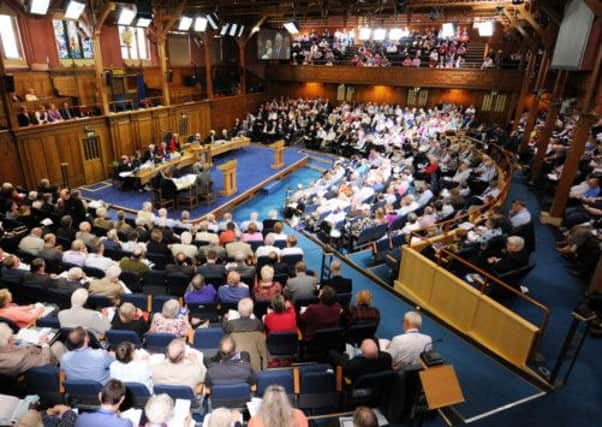Church of Scotland ‘not in crisis’ over gay clergy


The Presbytery of Lewis, in the Western Isles, and the congregation of Logie and St John’s in Dundee, added voiced discontent over the vote last month by the Kirk’s General Assembly.
They join a number of other congregations considering leaving the church over moves to allow the ordination of openly gay clergy.
Advertisement
Hide AdAdvertisement
Hide AdIn addition, the Rev Andrew Downie of Benbecula Church of Scotland resigned yesterday as a minister over the row. A number of elders in his parish, which also covers the north end of South Uist, are expected to vote on leaving the Kirk.
The Presbytery of Lewis contains 11 congregations, but a Church of Scotland spokesman insisted yesterday the Kirk is only aware of fewer than ten congregations out of 1,400 voicing an intention to vote on leaving.
The spokesman said: “Following the decision, a number of individuals have indicated they might wish to leave the Church of Scotland.
“While we would be saddened by the departure of any of our ministers and members, the church is not in crisis.”
He also dismissed fears the current schism could have a similar effect on the Kirk as the Disruption in 1843 when nearly a third of ministers left the church.
The spokesman added: “The vast majority of Church of Scotland ministers and members are committed to the church and willing to work out, over the next couple of years, how we live with difference.
“They see the recent decision of the General Assembly as a vote for the peace and unity of the church.
“However, it is not surprising that a small number of ministers and members reacted immediately to decisions taken at the General Assembly.
Advertisement
Hide AdAdvertisement
Hide Ad“There has always been a variety of views on the matter of same-sex relationships and the ministry.
“The work of the Church of Scotland – preaching the Good News and caring for the vulnerable the length and breadth of the country – continues unabated.”
He said they had received the resignation from Mr Downie and he would be leaving in August.
The Kirk’s General Assembly voted last month to consider a move that, while affirming its traditional stance on sexuality, would allow congregations to appoint an openly gay minister who was in a civil partnership.
Yesterday, The Scotsman reported that two congregations in Edinburgh had become the latest to consider leaving.
The Lewis Church of Scotland Presbytery said: “The Church of Scotland Presbytery of Lewis states its total opposition to the selection, training and ordination for the ministry of Word and Sacrament of those in same sex civil partnerships.”
Mr Downie said: “I feel I am an evangelical Bible-believing minister and have preached the word of God as long as I have been a minister. For the last four years I have been trying to resist the direction the Church of Scotland is going.”
He added that he feels the church has “turned her back on God’s word by allowing ministers who claim to be Christians and [claim] to follow the Bible” to be involved in same-sex relationships.
Advertisement
Hide AdAdvertisement
Hide AdSimon Barrow: More a small step than a giant leap, but full inclusion now looks inevitable
To A slightly bemused watching world, the pace with which the Church of Scotland is facing up to issues of sexuality seems painfully slow.
Given the centuries by which ecclesiastical history measures itself, however, the General Assembly’s decision to allow individual congregations to depart from its traditional closed door towards partnered gay and lesbian people in ministry looks like a giant leap forward.
This contrast tells you all you need to know about how tough it is for a historic institution to remain faithful to its inheritance while negotiating a fresh place in the fast-paced modern world.
In theory, yesterday’s “deliverance” – or resolution – squares the circle by allowing those who oppose change to say the official position of the Kirk remains theirs, while permitting local variation according to conscience. But whatever conservatives claim, this vote shows that the drift towards accepting gay people in the Kirk is continuing.
Indeed, while seeking pastoral sensitivity towards their opponents, the advocates of change believe that full inclusion is now inevitable.
Nevertheless, it will not happen instantly.
The next year will be in limbo.
At the 2014 General Assembly, a measure to enact this week’s deliverance within Church law will be voted on.
If passed, it will need to be approved by a majority of presbyteries.
So, further pitfalls remain possible.
Advertisement
Hide AdAdvertisement
Hide AdBut it will be exceedingly difficult for the Kirk to turn back on what is has now done, which is to recognise that partnered homosexual people may have a legitimate divine calling to ministry.
Meanwhile, the longer this reform takes, the more painful and damaging it is for a Church that still aspires to a central role in the life of a nation contemplating its own future.
Convincing people it has a message of both relevance and abiding importance is central to the Kirk’s mission.
Further introspection and dissention is as harmful to the prospects of a religious body as it is to a political party.
Stories of growth and vitality are what the General Assembly wants heard.
But that requires a public perception of pulling together.
Unity is the commodity that Kirk people are keen to speak of. But the institution they are part of still struggles to manifest it.
• Simon Barrow is co-director of Ekklesia, the religion and society think tank.